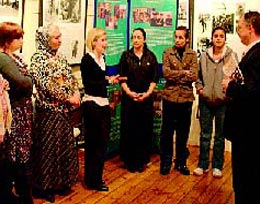A range of stereotypes surround the Roma. EMILIA MARCHELEWSKA talks to community members in Ireland about an ethnic group that some love to hate
Do you know the difference between the Roma and Rom-anians? If you don’t, you’re not the only one. While it’s easy to see where the confusion arises – they come to Ireland from the same part of Europe, and share a similarity in their names – these two ethnic groups could not be more distinct.
“The Roma have a totally different culture, language, beliefs and lifestyle than Romanians,” explains Anca Lupu of the Romanian Community of Ireland (RCI). Lupu is a Romanian who taught in a Roma village in her homeland, and therefore has a footing in both cultures.
Roma people began coming to Ireland in the late 1990s, first as asylum seekers from Romania and later as migrant workers after Romania’s accession to the EU. Today the Roma population in Ireland is estimated at up to 7,000.
As the majority of Roma come here from Romania, the two cultures are often mixed up. Recognising the difference, says Lupu, is crucial in providing a culturally appropriate service and to encourage greater understanding.
The Roma or Romani have their origins as a nomadic tribe in medieval India that later spread across Europe. Through-out their history, the Roma have lived on the margins of society, and experienced persecution, prejudice and social exclusion.
Lupu compares their level of integration and interaction with Romanian society to that of Travellers in Ireland. Indeed, Roma in Ireland can identify much with the Traveller community in terms of their everyday experience.
Lidia Adam, a volunteer with Pavee Point’s Roma programme, came to Ireland with her family to escape discrimination at home, only to be confronted with similar attitudes here.
“When I go to a hospital I’m treated very badly,” she says. “They don’t serve me in a shop like everybody else. If a job is advertised in a paper and a Roma person applies they say ‘Oh, it’s gone.’”
Programme co-ordinator Sarah Russell adds that the way the Roma have been treated in their countries “brings a lack of trust of people from outside their community, especially service providers and government bodies. They are always a bit suspicious that people are not giving them the right information.”
At the same time, people in Ireland often look at Roma only as a group – with negative connotations – and not as individuals. “Some, when they find out you are Roma, will treat you badly,” says Adam, who notes that many Roma children try to hide their ethnicity to avoid being bullied at school.
Russell emphasises that understanding cultural differences – particularly in language – is crucial for service providers, highlighting the case of a young Roma woman who lost her baby in the Rotunda Hospital: this woman had been assigned a Romanian interpreter, which led to obvious communication difficulties.
But whatever the solutions might be, the problem is not exclusive to Ireland.
“The issue with Roma is a European one,” says the RCI’s Anca Lupu. “We have to come together to find ways and strategies to integrate Roma community better within our structures.”
Russell echoes her viewpoint. “The Roma community are here; they are Irish citizens, they are long-term residents – they are not going away.”
Indeed, given a chance to live without prejudice, there is no reason why the Roma cannot thrive in Ireland, argues Lidia Adam.
“Roma are very intelligent people but they don’t get a chance [in Romania],” she says. “My son David is first in the class. He’s the best. And he’s 100 per cent Roma.”












